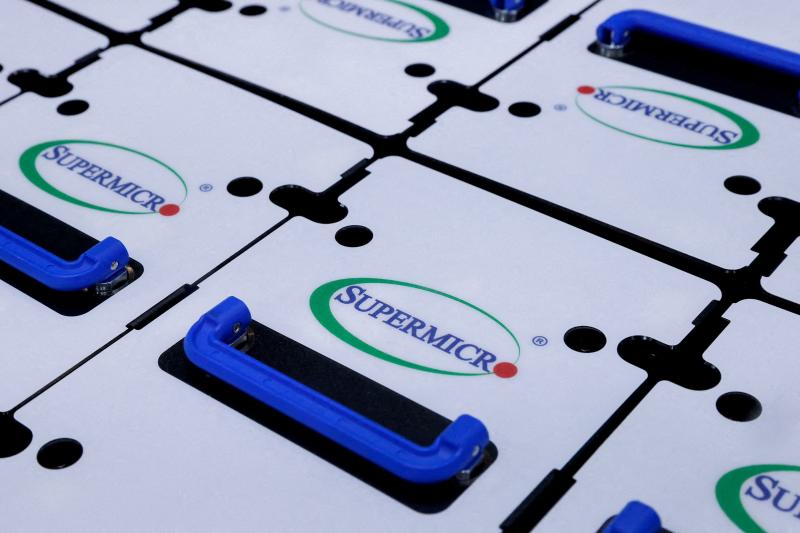Super Micro Computer Inc shares turned negative for the year on Thursday, as cascading concerns about the server maker’s finances continued to weigh on the stock.
Shares fell 16 percent on Thursday, building on the previous session’s slump of about 33 percent. The week’s selloff came after Ernst & Young LLP resigned as the company’s auditor, citing concerns about governance and transparency.
The stock had previously risen more than 300 percent to hit a peak in March of this year, making it one of the most prominent winners of investments in infrastructure related to artificial intelligence (AI). It has now lost all of that advance, tumbling by more than 75 percent since the March peak.

Photo: Ann Wang, Reuters
The auditor news is the latest red flag for the stock. Earlier this year, a short seller alleged accounting problems at Super Micro, and the company subsequently delayed a 10-K filing, saying it needed more time to assess its internal controls.
Argus Research downgraded the stock to "hold" from "buy" on Thursday, writing that the company’s loss of its auditing firm and a US Department of Justice probe “mean that the stock no longer trades on fundamentals.”
Still, analyst Jim Kelleher remains positive on the company’s long-term prospects, and “will look to get Super Micro back on the "buy" list once the company engages with a new accounting firm, becomes timely on its filings, and resolves all matters before the DoJ.”

With an approval rating of just two percent, Peruvian President Dina Boluarte might be the world’s most unpopular leader, according to pollsters. Protests greeted her rise to power 29 months ago, and have marked her entire term — joined by assorted scandals, investigations, controversies and a surge in gang violence. The 63-year-old is the target of a dozen probes, including for her alleged failure to declare gifts of luxury jewels and watches, a scandal inevitably dubbed “Rolexgate.” She is also under the microscope for a two-week undeclared absence for nose surgery — which she insists was medical, not cosmetic — and is

CAUTIOUS RECOVERY: While the manufacturing sector returned to growth amid the US-China trade truce, firms remain wary as uncertainty clouds the outlook, the CIER said The local manufacturing sector returned to expansion last month, as the official purchasing managers’ index (PMI) rose 2.1 points to 51.0, driven by a temporary easing in US-China trade tensions, the Chung-Hua Institution for Economic Research (CIER, 中華經濟研究院) said yesterday. The PMI gauges the health of the manufacturing industry, with readings above 50 indicating expansion and those below 50 signaling contraction. “Firms are not as pessimistic as they were in April, but they remain far from optimistic,” CIER president Lien Hsien-ming (連賢明) said at a news conference. The full impact of US tariff decisions is unlikely to become clear until later this month

GROWING CONCERN: Some senior Trump administration officials opposed the UAE expansion over fears that another TSMC project could jeopardize its US investment Taiwan Semiconductor Manufacturing Co (TSMC, 台積電) is evaluating building an advanced production facility in the United Arab Emirates (UAE) and has discussed the possibility with officials in US President Donald Trump’s administration, people familiar with the matter said, in a potentially major bet on the Middle East that would only come to fruition with Washington’s approval. The company has had multiple meetings in the past few months with US Special Envoy to the Middle East Steve Witkoff and officials from MGX, an influential investment vehicle overseen by the UAE president’s brother, the people said. The conversations are a continuation of talks that

CHIP DUTIES: TSMC said it voiced its concerns to Washington about tariffs, telling the US commerce department that it wants ‘fair treatment’ to protect its competitiveness Taiwan Semiconductor Manufacturing Co (TSMC, 台積電) yesterday reiterated robust business prospects for this year as strong artificial intelligence (AI) chip demand from Nvidia Corp and other customers would absorb the impacts of US tariffs. “The impact of tariffs would be indirect, as the custom tax is the importers’ responsibility, not the exporters,” TSMC chairman and chief executive officer C.C. Wei (魏哲家) said at the chipmaker’s annual shareholders’ meeting in Hsinchu City. TSMC’s business could be affected if people become reluctant to buy electronics due to inflated prices, Wei said. In addition, the chipmaker has voiced its concern to the US Department of Commerce